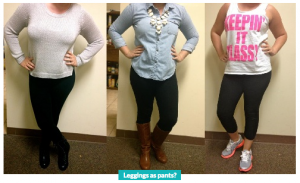
The BYU Testing Center has officially banned leggings, but it isn’t the only place on campus enforcing the Honor Code.
BYU is prominently known for its Honor Code, which encourages students to live by certain standards like honesty, virtue, clean language and modesty in dress and grooming, among other things.
Since the 1940s it’s been a rule that students can be turned away from any campus services if their appearance does not follow the dress and grooming standards found in the Honor Code.
Previously, that just meant students had to wear clothing that covered certain areas of the body. Now, students must make sure to save their leggings for another day.
Some students have claimed to outsmart the Testing Center roadblocks by tying jackets around their waists or wearing long sweaters. One student tweeted a picture of a BYU athlete wearing Under Armour leggings earlier this month. The caption said, “So athletes can wear leggings in the testing center but I can’t?”
The leggings controversy extends beyond the BYU campus. Kelli McKnight, a fashion blogger from Kansas, wrote on her blog, The Story Place, that leggings are “cheap and comfortable.” But that wasn’t her only thought on leggings.
“All that rationalization still does not make leggings … well, pants. I’m sorry. Leggings are more on the line of panty hose, really. Nontransparent panty hose. The double cousin of tights,” McKnight wrote.
The most common reason for wearing leggings instead of pants is the comfort, but that is not the case for everyone.
Jenna Leiva majors in physical education, so wearing athletic clothing, like leggings, is her “go-to.” “There is obviously a difference between athletic leggings and the cotton ones, but it’s a thin line,” she said.
The thin line may sometime confuse students who are unsure what to wear to avoid getting sent home from the Testing Center or the Cannon Commons.
Bryan Bradley, Testing Center assessment manager and consultant, said, “We follow the Honor Code.”
Both BYU’s Testing Center and the Cannon Commons Center at Helaman Halls referred to the Honor Code when asked how the rules are followed.
Cannon Center Secretary Kaliesha Foy said everybody entering the building must be dressed appropriately, whether they are EFY participants or guests visiting a student.
Foy said the most commonly seen violation is shorts that are too short. “When asked to change, they will usually say something like, ‘Oh, I just finished a workout,’ but it does not matter. They still need to be dressed appropriately,” Foy said.
According to the men’s dress standards on the Honor Code website, “Clothing is inappropriate when it is sleeveless, revealing, or form fitting. Shorts must be knee-length or longer.”




